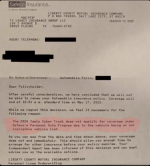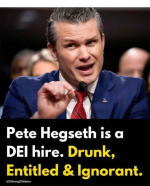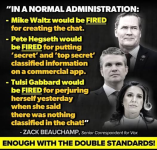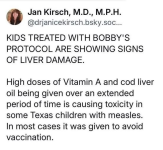You are using an out of date browser. It may not display this or other websites correctly.
You should upgrade or use an alternative browser.
You should upgrade or use an alternative browser.
Photos, vids, etc ....
- Thread starter Shiftless2
- Start date
Oh?"Teslas are becoming uninsurable. And if you can't insure it you can't drive it and you won't be able to sell it if the new owner can't insure it either." S2 #1,821
Perfectly circular."The 2024 Tesla Cyber Truck does not qualify for coverage ... due to the vehicle being on our ineligible vehicle list." LCMIC
It's an interesting half-a-story.
The other half may be more interesting still.
Shiftless2
Well-known member
What exactly is "half a story" - as in insurance underwriter lots of things are uninsurable. And not because of moral arguments (or whatever) but just because they represent unacceptable risks.It's an interesting half-a-story.
It doesn't qualify because it's on the ineligible list. That answers nothing.What exactly is "half a story"
Why is it on the ineligible list? *
- Excessive stopping distance? (inadequate brakes)- as in insurance underwriter lots of things are uninsurable. And not because of moral arguments (or whatever) but just because they represent unacceptable risks.
- Spontaneous combustion? (sparks more than conversation)
- Political intrigue? ("chicanery" confuses the issue with racetrack jargon)
Tesla markets more than one model of automobile. If the rest of them "qualify" why does the cyber truck not?
More to the point, the automotive industry is substantially regulated: NHTSA, DOT, etc, in addition to regulations on insurers.
Musk's truck put drivers on the road in late 2023, over 10,000 sold. https://en.wikipedia.org/wiki/Tesla_Cybertruck
That means millions of customer miles driven.
If there's a problem:
a) what problem? *
b) Why has it taken so long to recognize the problem, and respond?
c) Why hasn't Tesla identified and recalled the problem vehicles?
Bear in mind:
When Chevy had a problem with their Cobalt model cars killing their drivers, GM
How many other automobiles are on this ineligible list? Why has the public been exposed to this business fraud?"The 2024 Tesla Cyber Truck does not qualify for coverage ... due to the vehicle being on our ineligible vehicle list." LCMIC
Are the vehicles on the list not sold to consumers on the premise that they're street legal? If not, how did the buyers drive them off the lot?
This story raises more questions than it answers.
Shiftless2
Well-known member
How about they're a prime target of vandals - why would an insurance company want to insure something that's going to end up being vandalized?It doesn't qualify because it's on the ineligible list. That answers nothing.
Why is it on the ineligible list? *
- Excessive stopping distance? (inadequate brakes)
- Spontaneous combustion? (sparks more than conversation)
And then there's the little issue of how many fatalities it's been involved in.
No idea what you think is fraudulent here?How many other automobiles are on this ineligible list? Why has the public been exposed to this business fraud?
And each insurance company will have it's own list of what they will and will not insure.
This is no different in principal than an insurance company refusing to insure someone who has had half a dozen impaired driving convictions.
The vehicles are street legal - just nobody wants to insure them. That is all.Are the vehicles on the list not sold to consumers on the premise that they're street legal? If not, how did the buyers drive them off the lot?
This story raises more questions than it answers.
It may seem a paradox, or contradiction to the layman. But though hazard may seem the nemesis of insurers,"How about they're a prime target of vandals - why would an insurance company want to insure something that's going to end up being vandalized?" S2 #1,825
hazard is paradoxically its raison d'être.
Insurers would be extraneous, irrelevant, non-existent without hazard.
Insurance is a gamble, for insurer & insured. But as in any gambling hall, the odds are stacked in favor of the house, also a practical necessity.
Over a dozen times more likely to die by immolation than Ford Pinto passengers? What the truck !?"And then there's the little issue of how many fatalities it's been involved in." S2 #1,825
Even if not explicit, such automobile purchase is likely (certainly?) for use as an automobile on public roadway."No idea what you think is fraudulent here?" S2
In New York State automobiles are required to be insured. BUT ! Only for liability.
If THE problem with Musk's Cyber Truck is vandalism, ULTRA-SPECTACULAR ! Then do NOT insure it against that.
Caveat Emptor"And each insurance company will have it's own list of what they will and will not insure." S2
The difference is the choir boy that never broke a law until the horrendous trauma [Broca's Brain] commits the remainder of his life to violent binge drinking and destructive mayhem."This is no different in principal than an insurance company refusing to insure someone who has had half a dozen impaired driving convictions." S2
Automobiles go to the repair shop.
Mathematically:
If covering vandalism claims increases insurer cost by 5,000%, ultra-spectacular! Then increase insurance premiums FOR VANDALISM by 6,000% [sic]. BUT !!
If the conventional liability insurance burden maintains approximate parity with the rest of U.S. roadway population (rolling stock), then simply refusing to provide legally mandated insurance results in:
a) the consumer bought the Cyber Truck to haul goats, and buy Cheeto's. At time of sale the unwary consumer was swindled into believing that utility would outlast the vehicle purchased for that purpose.
b) AFTER the purchase the producer (Tesla), the insurer (State Pharm), and government conspire to change the rules, leaving the consumer out $100,000.oo $dollars. He can't use it. He can't re-sell it.
c) Denying current good faith owners access to public roadways is ridiculous. In that lose : lose scenario, only the $Billionaires $benefit.
c1) Musk, cause he sold a vehicle ostensibly viable for 7 years, but only viable for one.
c2) Ford, for selling the victim an F150 replacement.
It is a conspicuous atrocity of injustice. And not a trivial injustice. Not only do many workers commute to earn their salaries, the source of the $tax they pay. For many, the automobile is the 2nd most valuable $asset, next to the home, real estate.
McD's is hiring. If they don' wanna, that's what government is for. Insurance is government regulated."The vehicles are street legal - just nobody wants to insure them. That is all." S2
If they don't want to insure because inadequate brakes result in increased Cyber Truck collisions, magnificent! Then that should have been made clear BEFORE initial purchase.
Changing the rules AFTER the $100k$Sale is a swindle, unacceptable from a government regulated industry.
Shiftless2
Well-known member
"How about they're a prime target of vandals - why would an insurance company want to insure something that's going to end up being vandalized?" S2 #1,825
It may seem a paradox, or contradiction to the layman. But though hazard may seem the nemesis of insurers,
hazard is paradoxically its raison d'être.
Insurers would be extraneous, irrelevant, non-existent without hazard.
So how much premium do I need to charge when vandalism can range anywhere from needing a new paint job to complete torching of the car? How about the full value of the car?
Coverage is available for otherwise uninsurable drivers (Facility or Facility Association depending on the domicile)Even if not explicit, such automobile purchase is likely (certainly?) for use as an automobile on public roadway.
In New York State automobiles are required to be insured. BUT ! Only for liability.
And who is going to be sued if a passenger is burned alive?Over a dozen times more likely to die by immolation than Ford Pinto passengers? What the truck !?
One of the largest single private passenger auto claims I ever saw involved an Olds Vista Cruiser. The car was waiting at a toll booth when someone in the next lane pulled up with a trailer using a homemade trailer hitch. The trailer broke loose and it ran across into the next lane where it punctured the gas tank on that Olds - it burst into flames- thing was Grandma and the three grandkids were in the back seat. None escaped. And none survived. As you can imagine, everyone in sight was sued - total damages amounted to $108 Million dollars - yes that's "MILLION". No sane insurance company wants anything to do with anything like this.
Or perhaps another example. Father has a company car and, supposedly he's the only one that is allowed to drive it. But the teenage son decides to borrow it (the jury has always been out on whether dad looked the other way or not). In any case the kid picked up a couple of buddies and hit the local package store (all were under age). And after imbibing they headed off down the highway - lost control taking an exit ramp too fast and ended up piling into an unused ConEd pole (i.e., electical pole). Of course the car burst into flame and the results weren't pretty (the autopsy showed that all the kids had soot in their lungs which means they were alive when the fire started).
How did I find out about this? At the time I was a consulting actuary and one of my clients was a reinsurer (the guys who insure insurance companies). My client's coverages kicked in above a $10 million deductible on a number of fronts:
- The insurer who provided coverage for the father's company car;
- The liability insurer who insured the father's employer;
- The company that provided liability coverage to the package store that sold the booze in the first place;
- The local department of highways because if the exit ramp had been properly banked the car wouldn't have gone off the road in the first place (and I'm sure whatever engineering firm had signed off on the design wasn't off the hook either);
- The ConEd who had left an unused pole there - after all without the pole the car wouldn't have burst into flames;
- The insurer who provided products liability to the car manufacturer - after all, if the car had been properly designed it would never have burst into flames.
My client was providing coverage excess of $10 million on every one of those. Have to say that I moved on so wasn't there to see what the results were when all the court cases finally settled but ....
Part 1 of 2
I don't have that information. BUT !!
The insurance company does. AND !
If the situation is in flux (as the Cyber Truck is likely to be), the insurer may wish to limit maximum policy duration to 90 days, so that if there's a sudden huge leap (change), the insurer's exposure will be minimized.
I expect an asymmetric bell curve here. Musk's spit hit the fan, and the peace & love burst forth. I suspect it's peak, and then taper off, but more gradually than the slope approaching peak claims / insurer liability.
----
The biggest $settlement I've encountered was a family whose vehicle was rear-ended, vehicle caught fire, investigation revealed auto manufacturer internal memo disclosing knowledge of the problem, and the evident management decision it would be cheaper to pay insurance claim settlement than fix the problem.
The crash victim attorney argued the automaker should be docked two weeks $pay ($Billions), and that attorney won. I don't know what his $cut% of the settlement was.
That's the right question for sure."So how much premium do I need to charge when vandalism can range anywhere from needing a new paint job to complete torching of the car? How about the full value of the car?" S2 #1,827
I don't have that information. BUT !!
The insurance company does. AND !
If the situation is in flux (as the Cyber Truck is likely to be), the insurer may wish to limit maximum policy duration to 90 days, so that if there's a sudden huge leap (change), the insurer's exposure will be minimized.
I expect an asymmetric bell curve here. Musk's spit hit the fan, and the peace & love burst forth. I suspect it's peak, and then taper off, but more gradually than the slope approaching peak claims / insurer liability.
Grammatically it's a simple matter to contractually exempt the insurance company explicitly in the policy contract. I suspect the legal (government / regulatory) complications vary State to State."And who is going to be sued if a passenger is burned alive?" S2
In the Tesla / Cyber Truck case I suspect the stats fairly accurately tell the tale, statistical error owing in large part to unreported incidents (I suspect).One of the largest single private passenger auto claims I ever saw involved an Olds Vista Cruiser. The car was waiting at a toll booth when someone in the next lane pulled up with a trailer using a homemade trailer hitch. The trailer broke loose and it ran across into the next lane where it punctured the gas tank on that Olds - it burst into flames- thing was Grandma and the three grandkids were in the back seat. None escaped. And none survived. As you can imagine, everyone in sight was sued - total damages amounted to $108 Million dollars - yes that's "MILLION". No sane insurance company wants anything to do with anything like this.
Or perhaps another example. Father has a company car and, supposedly he's the only one that is allowed to drive it. But the teenage son decides to borrow it (the jury has always been out on whether dad looked the other way or not). In any case the kid picked up a couple of buddies and hit the local package store (all were under age). And after imbibing they headed off down the highway - lost control taking an exit ramp too fast and ended up piling into an unused ConEd pole (i.e., electical pole). Of course the car burst into flame and the results weren't pretty (the autopsy showed that all the kids had soot in their lungs which means they were alive when the fire started).
How did I find out about this? At the time I was a consulting actuary and one of my clients was a reinsurer (the guys who insure insurance companies). My client's coverages kicked in above a $10 million deductible on a number of fronts:
My client was providing coverage excess of $10 million on every one of those. Have to say that I moved on so wasn't there to see what the results were when all the court cases finally settled but ....
- The insurer who provided coverage for the father's company car;
- The liability insurer who insured the father's employer;
- The company that provided liability coverage to the package store that sold the booze in the first place;
- The local department of highways because if the exit ramp had been properly banked the car wouldn't have gone off the road in the first place (and I'm sure whatever engineering firm had signed off on the design wasn't off the hook either);
- The ConEd who had left an unused pole there - after all without the pole the car wouldn't have burst into flames;
- The insurer who provided products liability to the car manufacturer - after all, if the car had been properly designed it would never have burst into flames.
----
The biggest $settlement I've encountered was a family whose vehicle was rear-ended, vehicle caught fire, investigation revealed auto manufacturer internal memo disclosing knowledge of the problem, and the evident management decision it would be cheaper to pay insurance claim settlement than fix the problem.
The crash victim attorney argued the automaker should be docked two weeks $pay ($Billions), and that attorney won. I don't know what his $cut% of the settlement was.
Part 2 of 2
The bottom line, a little sear bedrock philosophy:
In the service industries, the answer is never, never, NEVER no. Never! Instead the answer is always: This is how $much it'll cost you.
Better than saying no, if the insurer wants no part of it, charge preposterously more than it's worth, perhaps as much as they can justify charging to regulators,
and then after making the business proposition as unappealing as possible, leave it up to the prospective business partner (the uninsured) to make the decision.
The bottom line, a little sear bedrock philosophy:
In the service industries, the answer is never, never, NEVER no. Never! Instead the answer is always: This is how $much it'll cost you.
Better than saying no, if the insurer wants no part of it, charge preposterously more than it's worth, perhaps as much as they can justify charging to regulators,
and then after making the business proposition as unappealing as possible, leave it up to the prospective business partner (the uninsured) to make the decision.
Shiftless2
Well-known member
The liability side of auto insurance policies are standard - mandated by law - so the company cannot change things.Grammatically it's a simple matter to contractually exempt the insurance company explicitly in the policy contract. I suspect the legal (government / regulatory) complications vary State to State.
Not that simple - the insurance department has to approve rates (same as the situation with property polices that we've discussed on other threads - climate change and wild fires.Better than saying no, if the insurer wants no part of it, charge preposterously more than it's worth, perhaps as much as they can justify charging to regulators,
and then after making the business proposition as unappealing as possible, leave it up to the prospective business partner (the uninsured) to make the decision.
... don't mean to embellish here, but in a world gone mad (the context) your rational mind and deep professional insight is a welcome substitute for a smidge of good news. - but -"The liability side of auto insurance policies are standard - mandated by law - so the company cannot change things."
"Not that simple - the insurance department has to approve rates (same as the situation with property polices that we've discussed on other threads - climate change and wild fires." S2 #1,830
4 years ?
FOUR YEARS ?!

Shiftless2
Well-known member
coup d'état #1,832
coup d'é·tat (k′ dā-tä)
n. pl. coups d'état (k′) or coup d'états (dā-täz)
The sudden overthrow of a government by a usually small group of persons in or previously in positions of authority.
[French : coup, blow, stroke + de, of + état, state.]
The American Heritage® Dictionary of the English Language, Fifth Edition copyright ©2022 by HarperCollins Publishers. All rights reserved.
#1,832 is an exceedingly alarming proposal.
But it is an exceedingly alarming emergency, the Trump administration. So:
coup d'état
Then what?
President Vance?
If Trump & Vance are both removed, by Constitutional standards the next in line for presidential succession is Speaker Johnson [R].
Out of the frying pan, into the fire?
Hob·son's choice (hŏbsənz)
n.
A choice between what is available and nothing; a lack of an alternative.
[After Thomas Hobson (1544?-1630), English keeper of a livery stable, from his requirement that customers take either the horse nearest the stable door or none.]
The American Heritage® Dictionary of the English Language, Fifth Edition copyright ©2022 by HarperCollins Publishers. All rights reserved.
Shiftless2
Well-known member
"Hegseth" "Drunk" #1,834
"A lot of people that abuse drugs make the people that use them look bad." musician Mr. Marilyn Manson
My subjective preference is a bottle of beer during the game, rather than a glass of wine with dinner, BUT !!
I'm shallow enough a former drinker to not accuse alcoholism based on volume consumed, but instead on behavior.
If a human can function in stellar fashion I don't care if they guzzle a keg a minute. BUT !!
If they're such a bumbling incompetent that:
- instead of conducting war planning in a secure location, face to face, they conduct it on not secure social media
- don't get it together enough to keep a member of the press out of the loop
- demonstrate such reckless incompetence that our allies will be wary about sharing confidential intelligence with U.S.
that can be considered a severe long term blow to U.S. national security.
For Pete's Sake !
Shiftless2
Well-known member
DeLoreans at least looked cool .....

And were a far better car

And were a far better car
Expecially the model with the flux-capacitor! - zooom -"DeLoreans at least looked cool .....
And were a far better car" #1,836

musk (mŭsk)
n.1. a. A greasy secretion with a powerful odor, produced in a glandular sac in the abdomen of a male musk deer and used in traditional medicines and formerly in the manufacture of perfumes.
[Middle English, from Old French musc, from Late Latin muscus, from Greek moskhos, from Persian mušk, probably from Sanskrit muṣkaḥ, testicle; see mūs- in the Appendix of Indo-European roots.]
The American Heritage® Dictionary of the English Language, Fifth Edition copyright ©2022 by HarperCollins Publishers. All rights reserved.






